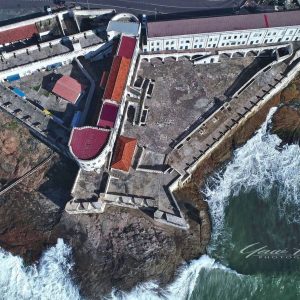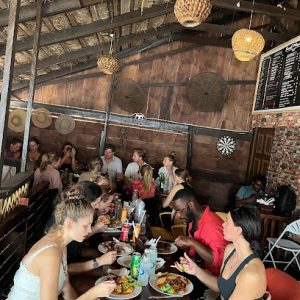1 Day
Daily Tour
Unlimited
English, Fante
The historical narrative unfolds in 1652 when Dutch control of a fortress slipped away to Swedish adventurers, leading to the establishment of Fort Carolusburg. Over the years, the fort changed hands multiple times among local inhabitants and various European powers. In a pivotal turn of events in 1664, the British successfully captured the fort after a four-day battle, renaming it Cape Coast Castle. This fortress then became the administrative center for British rule in the Gold Coast (Ghana) until the government relocated to Christianborg Castle in Accra on March 19, 1877.
The name “Cabo Corso,” translating to “short cape,” was chosen by the Portuguese for the local settlement where they erected a trade lodge in 1555. The corruption of this name to “Cape Coast” now designates the capital of Ghana’s Central Region. The Swedes, led by Krusenstjerna, played a key role in the castle’s establishment. They constructed a fort in 1653, naming it Carlousburg in honor of King Charles X of Sweden.
The strategic location of Cape Coast Castle, its proximity to St. George’s Castle (Elmina Castle), and its sheltered beach acted as compelling factors drawing European nations to the area. The Swedes initially faced challenges in retaining control of the fort, with subsequent captures by the Danes and the local Fetu chief. Dutch occupation commenced in 1660, culminating in the British fleet, led by Captain Holmes, seizing the fort in 1665 and transforming it into a castle by 1700.
During the peak of colonial rivalry in 1757, amid the Seven Years’ War, a French naval squadron bombarded Cape Coast Castle, causing severe damage. Subsequent reconstruction efforts by the English after 1760 involved the use of more durable materials and an enhanced sea defense system.
British dominance over the castle persisted into the late 19th century. The primary focus shifted from the slave trade, banned by the British in 1807, to trade in precious metals, ivory, corn, and pepper. In the eighteenth century, the castle’s role evolved into a hub for European education in Ghana.
Over the years, Cape Coast Castle served various functions, including being the West African headquarters of the president of the Committee of Merchants, the seat of the British governor, and a school. Now open to the public, it functions as a historical museum featuring a Ghanaian arts and crafts gift shop, serving as the regional headquarters of the Ghana Museums and Monuments Board.
 |
Castle Tour (Morning) Start your day with a guided tour of Cape Coast Castle. Explore the dungeons, cannons, and various chambers while learning about its rich history, including the periods of Dutch, Swedish, and British occupation. Gain insights into the castle's role in the transatlantic slave trade and the impact of colonialism on West Africa. Historical Museum Visit |
 |
(Late Morning): Head to the castle's historical museum, which houses artifacts and exhibits related to the region's history. Dive deeper into the cultural heritage of Ghana, colonial influences, and the castle's transformation into a center for European education. Take your time to absorb the wealth of information and displays. |
 |
Lunch at Cape Coast (afternoon): Enjoy a local lunch at one of the nearby restaurants in Cape Coast. Explore the vibrant atmosphere of the town and perhaps engage with locals to get a feel for contemporary Ghanaian culture. Relaxation at Castle Beach |
 |
(Early Afternoon): Take a leisurely stroll to Castle Beach, located near Cape Coast Castle. Relax by the shores, enjoy the sea breeze, and take in the beautiful coastal scenery. This provides a serene interlude, allowing you to reflect on the historical significance of the castle while enjoying the natural surroundings. Arts and Crafts Shopping |
Cape Coast Castle played a crucial role in the transatlantic slave trade and colonial history. It served as a major hub for European powers, witnessing transitions in ownership and functioning as a center for trade, administration, and, unfortunately, the inhumane trafficking of enslaved Africans.
Guided tours of Cape Coast Castle generally last about 1 to 1.5 hours. The duration may vary based on group size, visitor questions, and specific areas covered during the tour.
Yes, visitors have access to the dungeons during guided tours. Exploring these dungeons provides a somber but important understanding of the harsh conditions endured by enslaved individuals before they were transported across the Atlantic.
Photography is generally permitted in certain areas of the castle, but it’s essential to follow the guidelines provided by the tour guides. Some sensitive areas may have restrictions on photography out of respect for the historical context and the emotional nature of the site
While Cape Coast Castle itself may not have dedicated dining facilities, there are often nearby cafes or restaurants in Cape Coast town where visitors can find refreshments and meals. It’s advisable to check for local options before or after the castle visit.
Leave a review